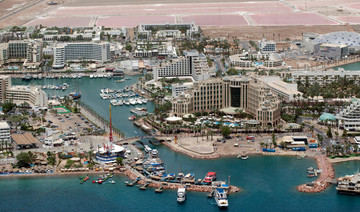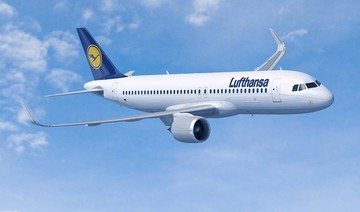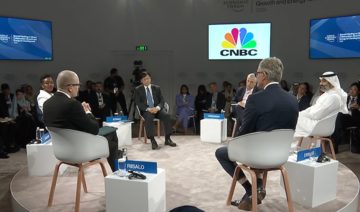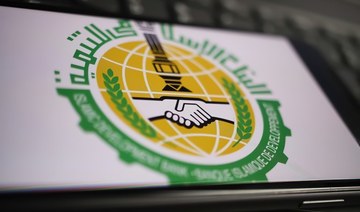FRANKFURT: German airline giant Lufthansa on Tuesday said the absorption of Air Berlin weighed on profits in the second quarter, but strong passenger numbers helped to keep the group’s full-year targets on track.
The group booked a net profit of €734 million ($860 million) between April and June, down 0.8 percent compared year-on-year but better than analysts had predicted.
Its adjusted pre-tax profits dipped 3.4 percent to €982 million, while revenues inched up 0.4 percent to €9.3 billion.
Lufthansa said higher than expected “one-off” costs related to the integration of parts of former rival Air Berlin into low-cost carrier Eurowings had “depressed” earnings, and would continue to weigh on the bottom line in the third quarter.
High fuel costs as well as delays and cancelations caused by unusually stormy weather also had “a negative impact” but were largely offset by rising passenger numbers and a cost-cutting drive, the group said in a statement.
“Without the integration costs at Eurowings, which we willingly accepted to further strengthen our market position in Europe, the group’s result would have grown,” said chief financial officer Ulrik Svensson.
The acquisition of many of Air Berlin’s aircraft and staff following its insolvency last year will see no-frills Eurowings grow its fleet to around 210 aircraft by 2019, stepping up competition with budget rivals like EasyJet and Ryanair.
The Lufthansa group — which includes Swiss, Brussels and Austrian Airlines — is also eyeing a chunk of struggling Alitalia’s fleet, as a wave of consolidation in the aviation industry shows no signs of abating.
Looking ahead, Lufthansa left its forecasts unchanged, targeting adjusted pre-tax profit “slightly below” 2017’s level of €2.4 billion.
Lufthansa profit dips as it digests Air Berlin
Lufthansa profit dips as it digests Air Berlin
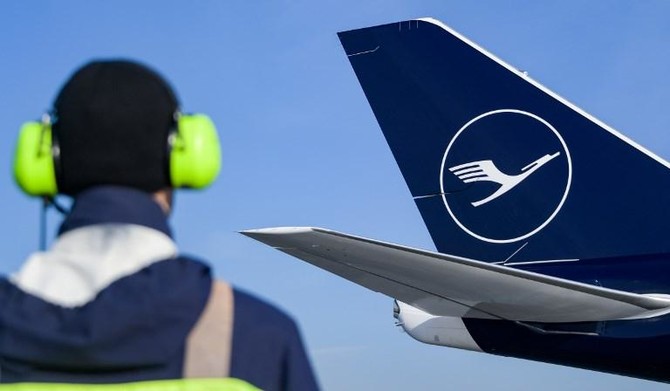
Homeland economies face growing challenges amid global turmoil, WEF special meeting in Riyadh told
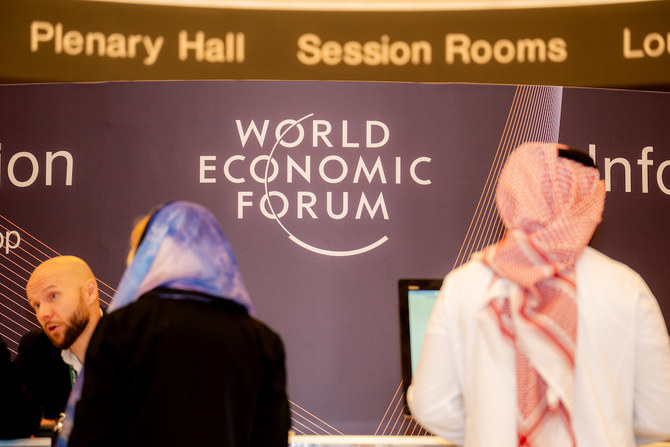
- Partnerships and alliances essential to restore equilibrium, protect security, experts and ministers tell panel discussion
RIYADH: Tensions in the Red are weighing heavily on Egypt, adding to the burdens caused by recent global crises such as the war in Ukraine and the pandemic, the country’s minister of planning and economic development told the World Economic Forum special meeting.
Speaking during a panel discussion on “What Homeland Economics Means for Trade,” Hala Elsaid Younes said that Egypt, like the rest of the world, has faced unprecedented crises in recent years, stemming from climate change problems, the global pandemic, the Russian-Ukraine war, and now the conflict in Gaza.
In order to combat these problems, Egypt has been focusing on controlling inflation, and investing in its labor force and infrastructure, she said.
“What is taking place in the Red Sea at the moment, where 50 percent of shipments are now rerouting, has caused a massive recedes in our profits. Regional and international tensions have also led to a rise in interest rates and soaring food prices.
“If this continues, governments will have little capacity to take care of their poor. We are working very hard on investing in our infrastructure by building more ports, and high railways to link the Mediterranean and Red Sea with inland destinations to expand our exports. We are lucky that over 70 percent of our population are less than 40 years old, so we are also investing in vocational training.”
Aloke Lohia, CEO of petrochemical firm Indorama Ventures, said that the company had to make “significant pivots” in recent years.
“We had a brilliant 20-year run where geopolitics were stable, interest rates were low, and the petrochemical business was growing. However, this all changed after COVID and current wars. Consumer demands and production are not matching anymore, and we are reducing 10 percent of our capacity.
“Homeland economies are great for countries which can leverage it, but not all countries are capable. Some countries, like my own Thailand, have to rely on tourism. So we are now looking at manufacturing our products in countries like India, where a large population resides alongside a stable government,” Lohia said.
US Congressman Brad Schneider said many countries are “looking for leadership.”
He added: “Complexities and uncertainties produce challenges for business; we need to engage in partnerships and alliances. I believe the world is safer when the US is engaged with the rest of the world. Creating equilibrium will be easier established when there are partnerships.”
Ahn Duk-geun, South Korean minister of trade, industry and energy, said that the world is “entering a dangerous phase of industrial competition, and we have to find a way to contain this race that so it won’t cause too much trouble for global trade.”
Clifford Kupchan, CEO of the consulting firm Eurasia Group, highlighted the risks posed by artificial intelligence.
“If AI gets into the wrong hands, the results will be worrisome. It will be very easy to create deepfakes and to create destructive weaponry. This will create an imbalance in world powers,” he said.
“When we talk about homeland economics, national security intervening with trade, I don’t think the prognosis is very good. This applies whether it is (Joe) Biden or (Donald) Trump who will head the presidency. We can be heading toward strategical degradation between the US and China.”
Saudi Arabia committed to green technologies, energy minister says
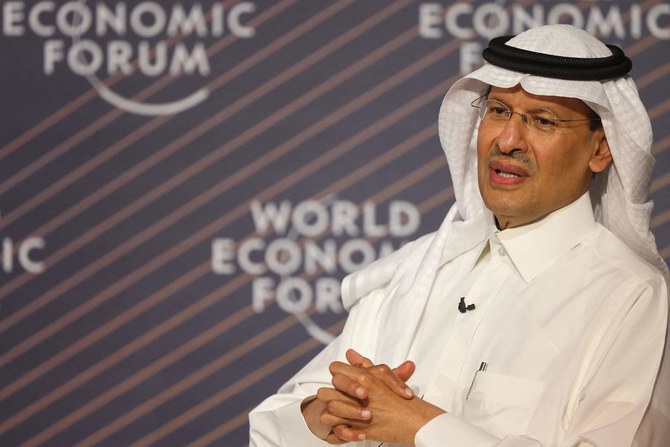
DUBAI: Saudi Arabia is focused on the production of green molecules, said Prince Abdelaziz bin Salman Al Saud, the Kingdom’s minister of energy.
“Our plans are clear to everyone, we are focusing on the molecule,” the prince said at a World Economic Forum meeting in Riyadh. “Being environmentally conscious is our human duty, whatever we do today should not endanger any aspirations of future generations.”
In a session focused on green molecules such as biofuels, hydrogen, and their derivatives, experts discussed various countries’ plans on how to move forward with the production of green molecules.
For his part, Prince Abdelaziz said he believed the concept should be color agnostic, because the molecule business has to do with how we produce clean energy, and that has no color.
“There is a carbon footprint that we need to manage and mitigate. I think stigmatizing things might narrow our choices rather than expand (them). We believe, as Saudis, that we require all the sources of energy, be it nuclear, hydrocarbon-based, or synthetic fuels. We are open to choices.”
The prince also said the kingdom is “libertarian” in its business approach, willing to share the expertise with other countries and that it is already in business with some European states.
“While the technology remains challenging, we continue to work on it to make it accessible and affordable to all,” he said.
The United Arab Emirate’s Minister of Energy and Infrastructure Suhail Al Mazrouei said that, as in Saudi Arabia, leaders in the UAE are aware of the need to invest in new energy.
“The region has become important in tackling problems and coming up with solutions,” Al Mazrouei said. “Clean energy is something we decided to venture into 17 years ago as we were thinking about what is going to happen when we export the last barrel of oil.”
Echoing the prince’s remarks, Al Mazrouei said consumers should not be limited to those considered ready simply because they can afford the price.
“We are working on the technology to make it accessible to all,” he said.
Amani Abou Zeid, commissioner for infrastructure and energy of the African Union, said that Africa has different levels of development and needs and expressed the need for alternative power options.
“Overall we are still electrified in only 49 percent of the continent, so more than half of the population doesn’t have electricity. Africa can’t afford to discard any solution at this point.”
Patrick Pouyanne, chairman and CEO of TotalEnergies SE, alongside Shrikant Vaidya, chairman of India’s Oil Corporation, and Erasmo Carlos Battistella, CEO of Be8, reiterated the importance of accessibility and affordability when producing green molecules.
Despite the positives from those countries engaged in the production of green molecules, such as job creation, there is still a long way to go.
Prince Abdelaziz said: “I think we should be conscious of the fact that the challenge is big, we are still talking about artificial intelligence, the component of the electrification, and what is required for it; the world will require clean molecules (and) it is our hope that we all work together to ensure this happens.”
IsDB annual meeting sees signing of several deals
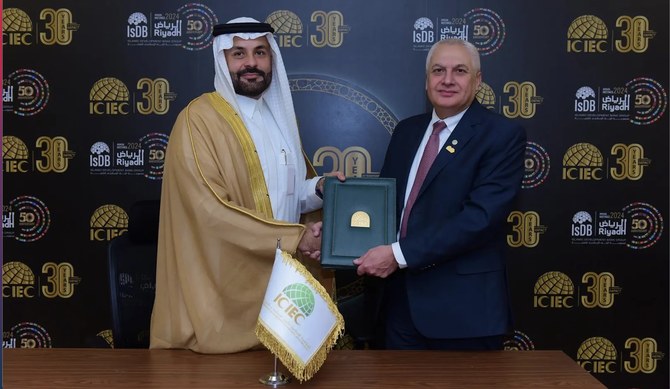
RIYADH: The 2024 annual meeting of the Islamic Development Bank Group saw the signing of several agreements, boosting the telecommunications sector in its member countries.
The Islamic Corporation for the Insurance of Investment and Export Credit, known as ICIEC, which specializes in providing Shariah-compliant insurance services and is a member of the IsDB, announced the inking of a memorandum of understanding with Huawei Technologies Ltd., the Saudi Press Agency reported.
The memorandum was signed by ICIEC CEO Osama Al-Qaisi and the chief operations officer of Huawei Technologies, Silas Zhang.
Under the agreement, ICIEC continues its collaboration with Huawei to enhance the telecommunications infrastructure and leverage advanced communication technology in IsDB member countries.
According to SPA, ICIEC will provide insurance solutions to support the provision of advanced communication network equipment and offer training to key telecommunications operators in member countries.
Al-Qaisi emphasized that the MoU with Huawei represents a significant roadmap toward supporting the enhancement of vital communication framework in member countries through the integration of advanced technology, extensive expertise, and distinguished insurance solutions offered by ICIEC.
He stated: “We are laying the foundation for strong growth and a qualitative leap in the telecommunications sector in member countries, where this collaboration rises to the level of partnership, enabling member countries to harness their full potential to establish a better and more innovative communications sector.”
The ICIEC also signed a MoU with the Federation of Contractors in Islamic Countries, known as FOCIC.
It was signed by Al-Qaisi, and FOCIC President Zakaria Abdul Rahman Al-Abdul Qadir on the sidelines of the IsDB event.
Al-Qaisi explained that the memorandum stems from the institution’s commitment to enhancing understanding and implementation of Islamic insurance in all member countries, aiming to establish a comprehensive framework for cooperation in the areas of knowledge exchange and technical capabilities in the insurance and contracting sectors.
Digital advancements propelling Saudi Arabia toward Vision 2030 goals: top official
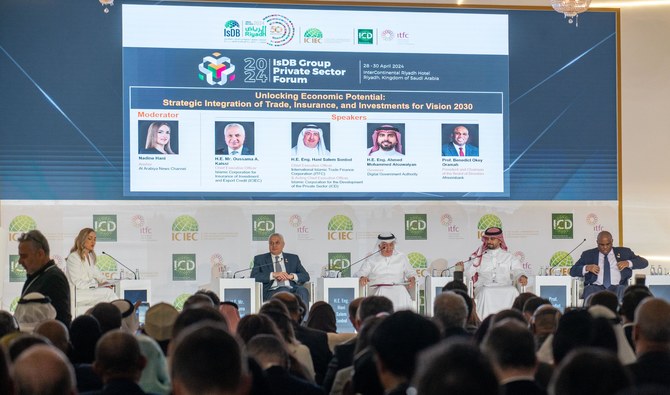
RIYADH: Digital advancements in Saudi Arabia have significantly enhanced efficiency across key sectors, reducing the need for physical visits to government departments and leading to considerable savings, said a top official.
Addressing the annual meetings of the Islamic Development Bank Group, Ahmed Al-Suwaiyan, governor of the Digital Government Authority, highlighted major improvements made through digitalization as part of Saudi Arabia’s Vision 2030 initiatives aimed at enhancing basic services.
He underscored the tangible benefits of increased productivity and decreased expenses for governments, citizens, and businesses.
“In Saudi Arabia, as part of the various programs and objectives of Vision 2030 for basic services, whether it is the issuance or renewal of national IDs, driving licenses, or even passports, before digitalization, it took more than four hours, including the waiting time at government departments,” said Al-Suwaiyan.
Today, he added, it actually takes less than two minutes without the need to visit the government department, requiring only three clicks.
“This has actually made us save more than 160 million trips and more than SR23 million annually,” said Al-Suwaiyan.
He emphasized that “this is the value that we are talking about,” highlighting how increasing productivity and reducing costs benefit not only governments but also citizens and enterprises through digitization.
The governor emphasized how digital transformation has influenced each pillar of the Vision 2030 goals, enabling swift advancements within the Kingdom.
“I would like to speak about Vision 2030, where digital transformation is a key enabler that we can see cross-cutting all the different sectors and all objectives in the development of Vision 2030. If we talk about a “vibrant society,” we can see a clear link with the participation and engagement for every citizen. And the same goes for a thriving economy,” he said.
The official further expressed that merely adopting digitization to do so is not the goal. Instead, the authorities’ efforts are simply a “means” to create a more efficient society.
In the Kingdom’s justice sector, a similar transformation has occurred with the establishment of fully operational virtual courts, where 95 percent of all hearings are conducted online.
However, the primary focus is not solely on the implementation of virtual courts, but rather on achieving specific outcomes.
One notable outcome has been the significant reduction in the time taken for case processing, with the average duration decreasing from 217 days to just 30 days, from the opening of the case to the issuance of the resolution.
This reduction in processing time exemplifies the tangible value derived from digital transformation efforts.
IsDB chief vows to support private sector in member states
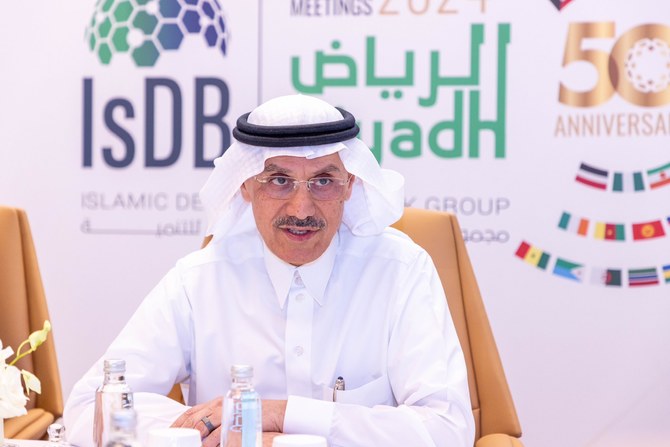
RIYADH: Since its establishment over 30 years ago, the Islamic Development Bank has supported its member states with $151 million in the form of investments and trade deals, said the top executive of the bank.
In his opening remarks at the 12th Private Sector Forum held on the sidelines of the 18th IsDB annual meetings in Riyadh on Sunday, the bank’s president, Mohammed Sulaiman Al-Jasser, said the financial institution has pumped in over $108 billion to support development projects in member states since its inception.
Speaking about the event, the IsDB chief said it offers potential investors an opportunity to network, exchange experiences, establish partnerships, and launch trade initiatives.
Al-Jasser said it is “a very good opportunity” to explore different opportunities and services provided by various IsDB institutions to support the private sector’s development.
He said the IsDB’s body to support the private sector in its member countries has initiated 451 projects worth $6.9 billion across various sectors such as the financial sector, agriculture, and energy.
“It has different investment operations in 50 countries. In 2023, it focused on supporting small and medium enterprises in member states,” Al-Jasser said.
He said the International Islamic Trade Finance Corp. was established in 2008 and has been supporting member states since then with financing facilities. “In 2023 alone, it issues loans worth over $75 million.”
The IsDB president said the bank strongly believed in supporting the private sector in member states.
Al-Jasser went on to say that the IsDB has “also signed many agreements and conventions to make use of the opportunities in the field of investment and trade” in member states.
The annual meetings coincide with IsDB’s golden jubilee, as the institution celebrates 50 years of promoting economic and social development in 57 member countries, under the slogan ‘Taking pride in our past, shaping our future: authenticity, solidarity, and prosperity’ that reflects the bank’s legacy and future goals.
Finance ministers, financial institutions’ representatives, Islamic finance experts, private sector, and non-governmental organizations are participating in the meetings.
Among the annual meetings’ prominent events are the Governors’ Roundtable, the 18th IsDB Global Forum on Islamic Finance, the IsDB Group Private Sector Forum 2024, the Philanthropy Forum, and the Future Vision Symposium, reported SPA.
Discussions address pressing issues such as multidimensional poverty, South-South cooperation, and financing the Sustainable Development Goals.
Meanwhile, the CEOs of the bank’s entities will meet in a strategic session titled ‘Unlocking Economic Potential’ which reflects IsDB’s commitment to promoting economic growth.


